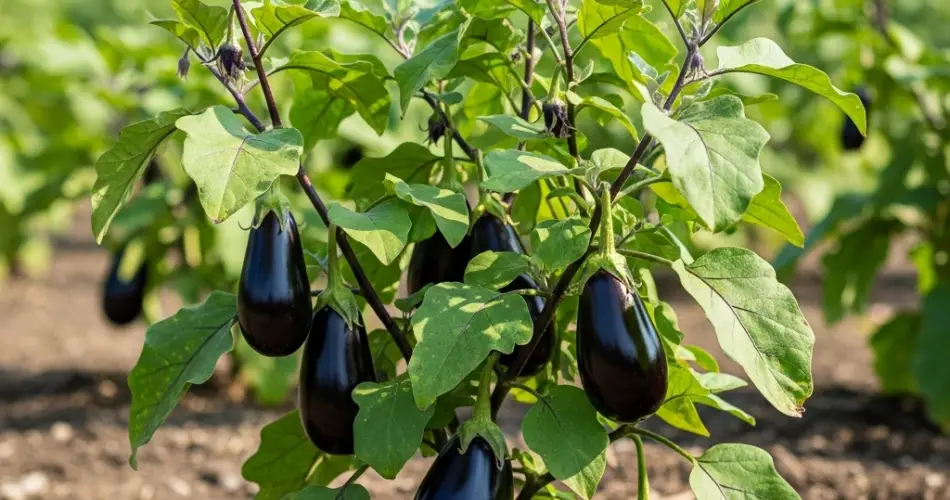Flea beetles are tiny but destructive pests that can wreak havoc on young eggplants. These small, shiny black or brown beetles chew countless small holes in leaves, giving them a shot-hole appearance. If left uncontrolled, flea beetles can stunt the growth of your plants or even kill young seedlings. Fortunately, you can stop them using safe and effective organic methods—no chemicals needed.
Here are three proven organic tricks to protect your eggplants and keep your garden thriving naturally.
1. Use Floating Row Covers to Block the Beetles
One of the easiest and most effective ways to stop flea beetles from attacking your eggplants is by using physical barriers—specifically, floating row covers. These lightweight fabric sheets create a protective shield over your plants while allowing light, air, and water to pass through.
How to Use Row Covers:
-
Install them immediately after transplanting your eggplants or as soon as seeds germinate.
-
Use hoops or supports to prevent the fabric from touching the plants directly.
-
Secure the edges tightly to the soil to block beetles from crawling underneath.
Flea beetles are highly active in spring and early summer. Covering your eggplants during this period prevents the insects from laying eggs near the base of the plants and feeding on the leaves.
Bonus Tip: Remove the covers once your plants are large enough to withstand minor damage or when they begin to flower, to allow for pollination.
2. Apply Neem Oil or Organic Insecticidal Soap
Neem oil is a powerful, natural pesticide derived from the seeds of the neem tree. It works by disrupting the feeding and reproductive cycles of flea beetles and many other pests, while being safe for beneficial insects when used properly.
How to Use Neem Oil:
-
Mix neem oil concentrate with water, following label instructions (usually around 1–2 tablespoons per quart of water).
-
Add a few drops of liquid dish soap to help the mixture stick to leaves.
-
Spray the mixture on eggplant leaves, especially the undersides where beetles tend to hide.
Repeat the application every 5–7 days, especially after rain. Consistency is key. Neem oil doesn’t kill instantly but gradually reduces flea beetle populations over time.
Alternative: Organic insecticidal soaps can also be effective. These soaps break down the beetles’ outer shell, dehydrating and killing them on contact. Be sure to spray during early morning or late afternoon to avoid leaf burn in the heat.
3. Trap and Distract Flea Beetles with Companion Plants
Companion planting is a smart way to keep flea beetles away from your eggplants by using “trap crops.” These are plants that the beetles prefer over eggplants. By planting them nearby, you can lure the beetles away and control their population more easily.
Best Trap Crops for Flea Beetles:
-
Radishes: One of the most attractive plants for flea beetles. Grow a few rows nearby to draw beetles away from your eggplants.
-
Mustard greens: Also highly preferred by flea beetles and can serve as sacrificial plants.
-
Nasturtiums: These help deter various garden pests and can confuse flea beetles when planted near eggplants.
After a few days, check your trap crops for beetle damage. You can either manually remove the beetles or dispose of the infested plants altogether.
Bonus Benefit: Companion planting also helps improve soil health, attracts beneficial insects, and boosts garden biodiversity.
Additional Organic Tips to Keep Flea Beetles Under Control
While the three strategies above are the core of organic flea beetle control, these extra steps can make your efforts even more successful:
-
Mulch with straw or wood chips: Mulching helps disrupt the beetles’ life cycle by preventing larvae from developing in the soil.
-
Water regularly but avoid overwatering: Healthy plants are more resilient. Keep soil evenly moist to avoid stress that can make eggplants more vulnerable.
-
Rotate crops annually: Flea beetles overwinter in soil and plant debris. Avoid planting eggplants or other nightshades (like tomatoes and peppers) in the same spot each year.
-
Remove weeds and garden debris: Weeds can host flea beetles, so keeping the area clean helps reduce hiding spots.
Final Thoughts
Flea beetles may be small, but their damage can be significant—especially to tender young eggplant leaves. Thankfully, there are several organic methods that can help you win the battle naturally. By combining row covers, neem oil treatments, and strategic companion planting, you can prevent infestations without the use of synthetic pesticides.
With these simple, eco-friendly tricks, your eggplants can grow strong, healthy, and productive, offering a rich harvest without the holes.



